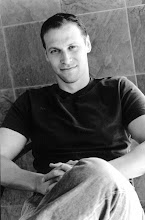A new anthology is out based on an interesting premise. Edited by Jessica Kaye, and Richard Brewer (of Mystery Bookstore fame), Meeting Across the River is a collection of stories, each inspired by Bruce Springsteen's same-titled song. As Martin J. Smith points out in his compelling introduction, the tune, from BORN TO RUN, has haunting noir under(over?)tones that lend it nicely to interpretation by crime writers.
Stories from Eric Garcia, William Kent Krueger, C.J. Box, Steve Hamilton, Eddie Muller, Philip Reed, David Corbett, the inimitable Barbara Seranella, and others make up this collection.
When approaching the idea, I decided to combine noir elements with a thriller tone. My story, called "The Real Thing," a phrase I stole from the song, opens thus: "Abbud's head had been blown apart by sniper fire, his scalp lying beside the bone like a bad rug or a misplaced halo. Ebi Al-Mansouri stood frozen in place, bits of window glass embedded in his bearded face, his heart hammering so loudly it seemed to jar his vision. Bullet split the fifth-floor flat, raining in from all sides."
Saturday, May 28, 2005
Tuesday, May 17, 2005
High Concept Low Quality
High concept is the end-all be-all for Hollywood and, increasingly, for publishing. But what is it? Essentially, it’s a script or book that can be summarized effectively in one or two sentences. And that has a hook—a plot reversal or inherent irony that is (we hope) unexpected and refreshing. A classic example is Armageddon: A giant meteor is headed for earth, and an unlikely crew of deep-sea drillers must land on it to explode it to save Earth. (What makes this truly high-concept is the constitution of the crew.) One of the clearest examples is Top Ten by Ryne Douglas Pearson. A serial killer is last on the FBI’s Top 10 most wanted list, but his ego demands he reach number one, so he decides to kill his way down the list to get there. But number three on the list is an FBI agent.
Some great books and film are high-concept, of course, and when paired with fine execution, they can make for art and entertainment at the highest level (think Hitchcock). But the trend toward high concept increasingly irritates me because as a writer, I find high concept one of the easiest parts of the jobs. I get five high-concept ideas a week. And that’s all they are. Ideas. The whole key, for me, is whether the ideas have story engines, enough meat to demand further exploration and plotting. What I find happening more and more is that novelists and screenwriters come up with a high-concept hook and sell their project on the basis of that, while not committing to the real work that elevates a project above mediocrity. Great high-concept hooks are inevitably exciting (how GREAT is the hook behind The Bourne Identity?) but as with everything, the devil is in the details (which Ludlum ALSO had down for his brand of fiction). Good pacing, plotting, plausibility, character development. So many blockbusters that have passed into popcorn and remainder obscurity suffer from writers who reached the first step and pitched camp there rather than toiling onward.
The job-and the art- is in what follows.
Some great books and film are high-concept, of course, and when paired with fine execution, they can make for art and entertainment at the highest level (think Hitchcock). But the trend toward high concept increasingly irritates me because as a writer, I find high concept one of the easiest parts of the jobs. I get five high-concept ideas a week. And that’s all they are. Ideas. The whole key, for me, is whether the ideas have story engines, enough meat to demand further exploration and plotting. What I find happening more and more is that novelists and screenwriters come up with a high-concept hook and sell their project on the basis of that, while not committing to the real work that elevates a project above mediocrity. Great high-concept hooks are inevitably exciting (how GREAT is the hook behind The Bourne Identity?) but as with everything, the devil is in the details (which Ludlum ALSO had down for his brand of fiction). Good pacing, plotting, plausibility, character development. So many blockbusters that have passed into popcorn and remainder obscurity suffer from writers who reached the first step and pitched camp there rather than toiling onward.
The job-and the art- is in what follows.
Subscribe to:
Posts (Atom)
